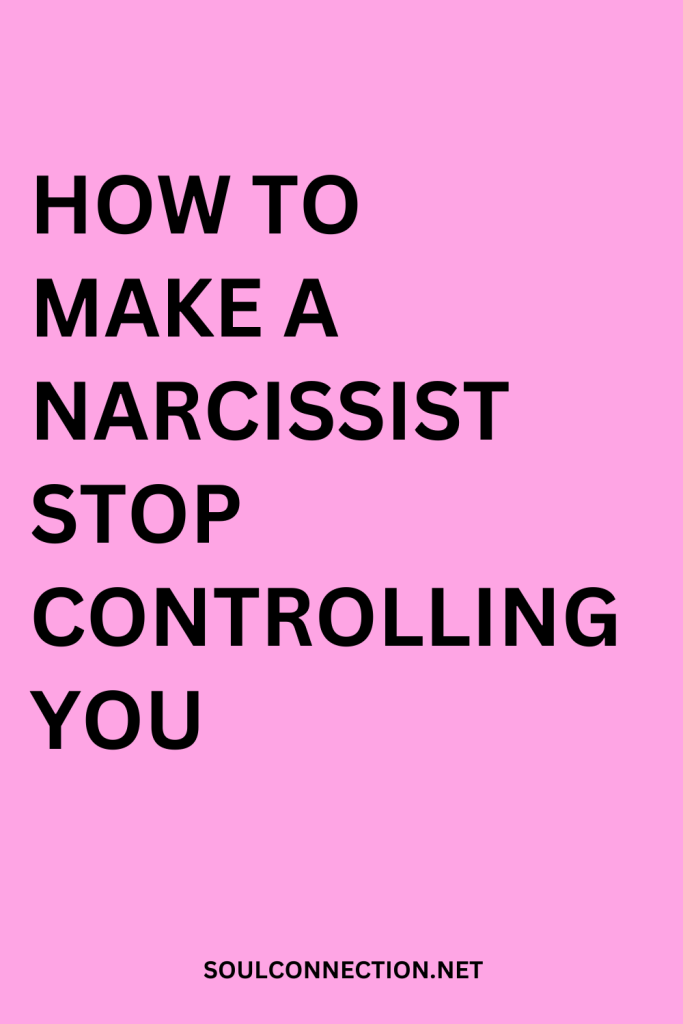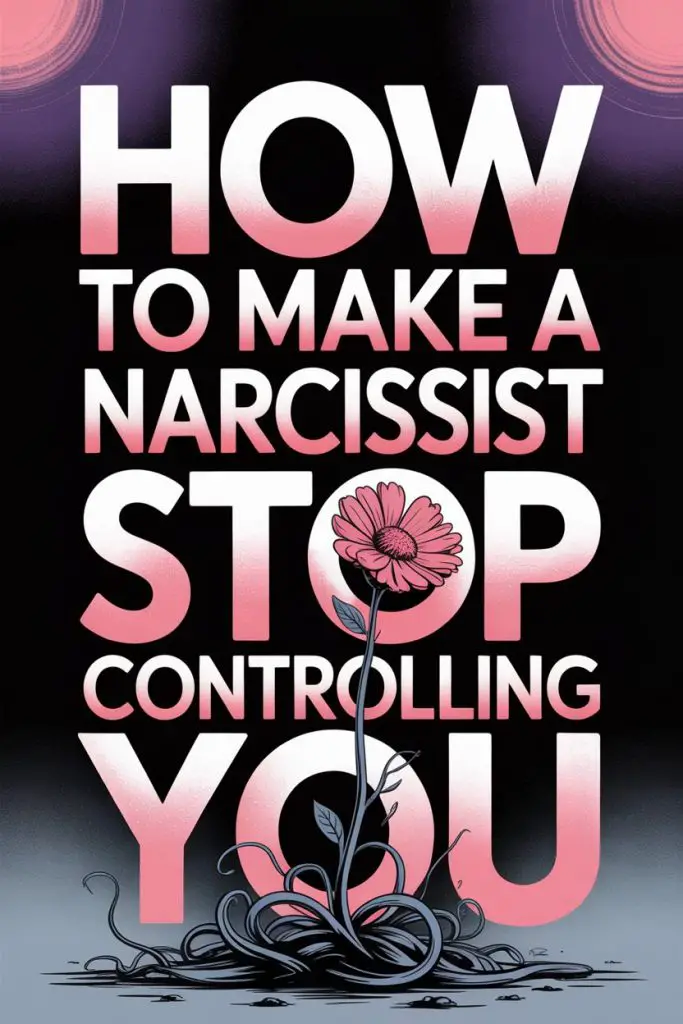If you’ve ever found yourself in a relationship with a narcissist, you know that “controlling” is not just a quirky personality trait—it’s basically their whole brand.
Handing over the remote is one thing. Handing over your self-esteem, sanity, and free will? Not today, Satan.
Here’s how to put on your emotional body armor and stop being someone else’s chess piece.
Spotting the Control—Because Denial is NOT Just a River in Egypt
Narcissists don’t introduce themselves saying, “Hi, I’ll be running your life from now on.”
Their control shows up in sneaky ways: guilt trips, gaslighting, monitoring your every move, deciding who you can see and what opinions you’re allowed to have.
If your “compromises” always look more like “capitulation,” you might be starring in the narcissist’s one-person puppet show. Recognizing the patterns is half the battle.
Boundaries: Not Just for Preschoolers and Garden Hedges
The word “boundaries” gets tossed around like confetti, but drawing the line with a narcissist isn’t just a self-care meme—it’s survival. Decide what you will and won’t tolerate.
Maybe it’s texts during work, uninvited snooping, or being told what to wear.
Announce your boundaries—firm, clear, and without a three-hour PowerPoint presentation. “I’m not okay with being spoken to like that” is enough.
Spoiler: They’ll push back. That’s when you double down.
Stop Explaining Yourself on Repeat
Narcissists love nothing more than a good old-fashioned debate about your feelings—mainly so they can dismiss them. You say, “That hurt me.” They say, “You’re too sensitive.”
You try again with different words. Rinse. Repeat.
Stop feeding the beast. State your needs, then move on. If they demand a justification for your boundary, just repeat yourself like a broken record. “This is what I need.” No TED Talk required.
Take Back Your Time and Space
Notice how your world keeps shrinking when a narcissist is running the show? Friends drift away, hobbies gather dust, and suddenly your favorite pastime is “placate the narcissist.” Not exactly a bestseller.
Start reclaiming your calendar. Accept that invitation, rejoin the trivia night crew, or dust off that guitar. Time apart might make the narcissist furious.
Stand your ground anyway. You’re not a support animal.
Gray Rock: Mastering the Art of Boring
Ready to make a controlling narcissist lose interest in micromanaging you? Act as fascinating as a beige wall. This technique—affectionately called “gray rock”—means keeping responses bland, factual, and uninteresting.
Don’t argue. Don’t emote. Don’t offer juicy tidbits about your day. Give them as much excitement as an insurance seminar.
The less drama they get, the more they’ll look elsewhere for their fix.
Embrace Your Inner Fact-Checker
Gaslighting is a narcissist’s favorite sport. Suddenly, your clear memory of Tuesday’s argument becomes a “figment of your imagination,” and you’re questioning your own sanity.
Keep a journal. Write down conversations, agreements, and decisions. If the narcissist rewrites history, you’ve got notes. No, it doesn’t make you paranoid. It makes you prepared.
No Is a Complete Sentence
“Can you drop everything and fix my problems right now?” is a classic narcissist request. The healthy response? “No.”
Not “No, but maybe later.” Not “No, unless you really need me.” Just: “No.”
Feel awkward? That’s normal. You’re not being selfish. You’re being a human with a spine. Use it.
Stop Apologizing for Existing
Narcissists are Olympic-level blame shifters. Spilled milk? You should’ve predicted the laws of physics. Bad mood? Clearly your fault.
Before you know it, you’re apologizing for things you didn’t even do.
Pause before saying sorry. Did you actually mess up, or are you just trying to keep the peace? Save apologies for genuine mistakes, not for the weather turning or their lost car keys.
Refuse to Be Baited Into Arguments
Narcissists are masters at turning every disagreement into a full-blown courtroom drama. Don’t take the bait, and don’t try to win. The moment you jump in, they’re pulling your strings.
Keep it simple: “I don’t want to argue about this.” Walk away if you need to. Not every invitation to a fight requires your RSVP.
Rebuild Your Support Network
Isolation is a narcissist’s best friend. They want you convinced that nobody else could possibly understand what you’re going through. Give them a rude awakening.
Reach out to friends, family, or even support groups. Share what’s going on—not in a “let’s bash my partner” way, but to remind yourself you’re not alone or crazy.
The more people in your corner, the harder it is for one person to box you in.
Therapy Is Not a Dirty Word
If you feel like you’ve been living in Opposite Land—where nothing makes sense and your self-worth is in the gutter—consider seeing a therapist. No shame in needing backup.
A good therapist can help you untangle the mental spaghetti, set boundaries, and rebuild your confidence. Some even specialize in narcissistic abuse. Shop around till you find someone who gets it.
Decide What You Want Your Exit Strategy to Be
Sometimes, limiting a narcissist’s control means limiting your contact. If you’re constantly walking on eggshells, you might need to ask yourself the hard questions: Is this relationship salvageable? Do you want it to be?
Making a plan—whether it’s a soft exit or just emotional detachment—can feel terrifying. But regaining agency means choosing what’s right for you, not just bracing for the next storm.
Relapse Happens—Don’t Beat Yourself Up
Standing up to a narcissist can feel like wrestling a greased octopus. Some days you’ll hold your boundaries like a boss. Some days, you’ll cave and agree to something ridiculous just to get some peace and quiet.
Progress isn’t a straight line. When you slip, don’t spiral into shame. Reset. Try again tomorrow. Every time you push back, you’re rewiring those old patterns.
Taking Back Control—One Step at a Time
Escaping a narcissist’s grip isn’t about a single, mic-drop moment of personal power. It’s an ongoing act—setting boundaries, saying no, reconnecting with your own life, and sometimes just surviving the daily circus.
Start small. Be stubborn. Prioritize your sanity.
And whenever the control starts tightening, remind yourself: you’re the main character, not the supporting cast in someone else’s ego drama.
Turns out, you do make a pretty great boss of your own life.


